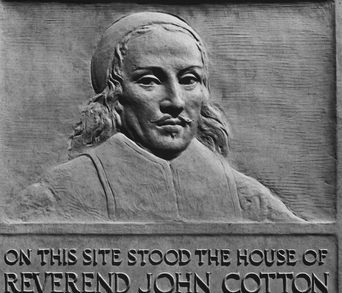Dear John from Oliver Cromwell

John Cotton, my 9th paternal great-grandfather, was born in 1585 in Derby, England and died in 1652 in Boston, Massachusetts. He was, according to many accounts, the preeminent clergyman and theologian of the Massachusetts Bay Colony. Cotton studied five years at Trinity College, Cambridge and nine at Emmanuel College, Cambridge, England. Cotton emigrated to Massachusetts in 1633 and helped establish the First Church in Boston. Cotton remained teaching elder (educational and doctrinal) at the church until his death in 1652.
“Mr. Cotton had a reputation for profound learning. He was accustomed to study 12 hours a day, published over 50 books, was a critic in Greek, wrote Latin with elegance, and could discourse in Hebrew.” (The Mather Project)
Letter
from Oliver Cromwell to John Cotton written after the Battle of Worcester,
October 2, 1651. The battle destroyed the last major Scottish Royalist
army. In the letter, Cromwell alludes to his difficulties with the Scots.
Correspondence from Oliver Cromwell to John Cotton
“WORTHY
SIR, AND MY CHRISTIAN FRIEND, “I received yours a few days since. It was
welcome to me because signed by you, whom love and honour in the Lord: but more
‘so’ to see some of the same grounds or our Actings stirring in you that are in
us, to quiet us to our work, and support us therein. Which hath had the
greatest difficulty in our engagement in Scotland; by reason we have had to do
with some who were, I verily think, Godly, but, through, weakness and the
subtlety of Satan, ‘were’ involved in Interests against the Lord and His
People.
“With what
tenderness we have proceeded with such, and that in sincerity, our Papers
(which I suppose you have seen) will in part manifest; and I give you some
comfortable assurance of ‘the same.’ The Lord hath marvellously appeared
even against them. And now again when all the power was devolved into the
Scottish King and the Malignant Party,— they invading England, the Lord rained
upon them such snares as the Enclosed will show. Only the Narrative in
short is this, That of their whole Army, when the Narrative was framed, not
five men were returned.
“Surely, Sir,
the Lord is greatly to be feared and to be praised! We need your prayers
in this as much as ever. How shall we behave ourselves after such
mercies? What is the Lord a-doing? What Prophecies are now
fulfilling? Who is a God like ours? To know His will, to do His
will, are both of Him.
“I took this
liberty from business, to salute you thus in a word. Truly I am ready to
serve you and the rest of our Brethren and the Churches with you. I am a
poor weak creature, and not worthy the name of a worm; yet accepted to serve
the Lord and His People. Indeed, my dear Friend, between you and me, you
know not me,—my weaknesses, my inordinate passions, my unskillfulness, and
everyway unfitness to my work. Yet, yet the Lord, who will have mercy on
whom He will, does as you see! Pray for me. Salute all Christian
friends though unknown. I rest, your affectionate friend to serve you,
(Signed) OLIVER CROMWELL